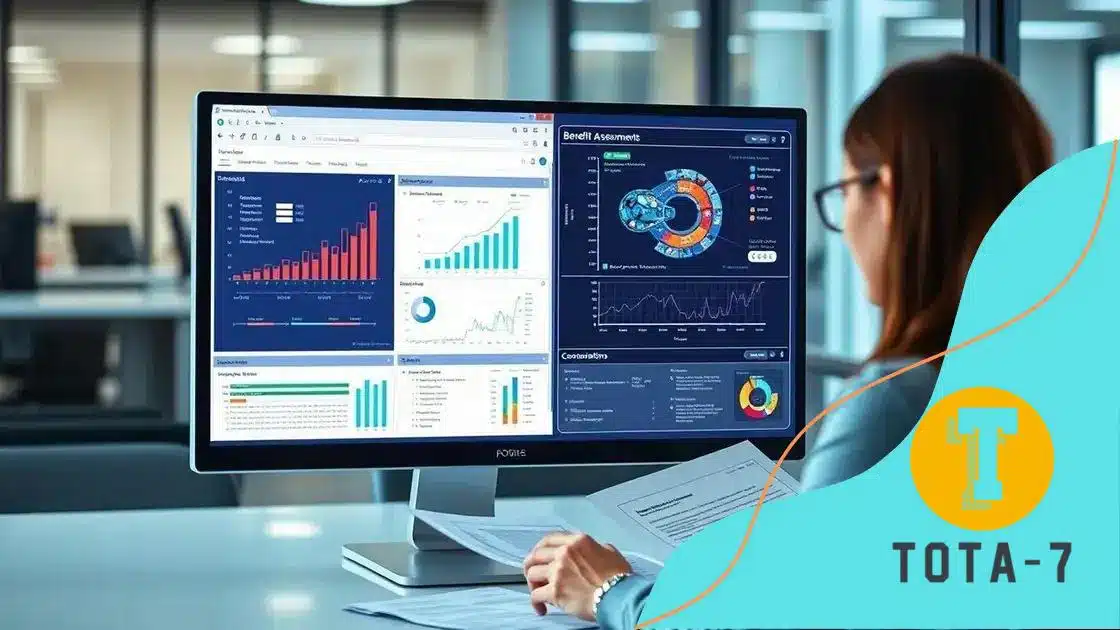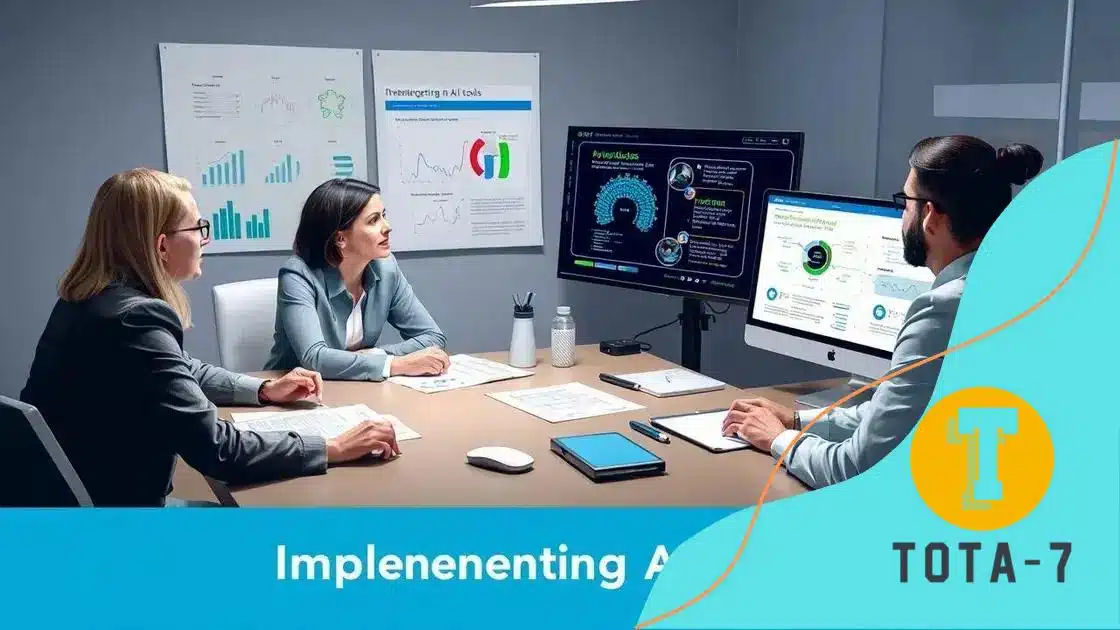AI tools assist with benefit eligibility reviews

AI tools assist with benefit eligibility reviews by enhancing accuracy and efficiency, enabling faster data processing, real-time insights, and more personalized services for applicants while overcoming challenges in implementation.
AI tools assist with benefit eligibility reviews in ways that can significantly improve efficiency and accuracy. Have you ever wondered how these technologies could simplify the often complex processes involved in determining eligibility for benefits? Let’s delve into their capabilities.
Understanding benefit eligibility reviews
Understanding benefit eligibility reviews is crucial for anyone involved in the process of assessing benefits. These reviews help determine whether individuals qualify for financial assistance or other services. They are essential for ensuring that the right resources are allocated to those in need.
What Are Benefit Eligibility Reviews?
A benefit eligibility review is a systematic process used to evaluate applications for benefits. It includes checking the applicant’s information, verifying income levels, and assessing other factors that may influence their eligibility.
Key Components of Reviews
- Application Analysis: Reviewing the submitted application in detail.
- Document Verification: Ensuring that all documents are authentic and relevant.
- Interviews: Conducting interviews if necessary to clarify information.
This analytical process can reveal essential details about applicants and ensure that benefits go to individuals who truly qualify. For example, thorough reviews can highlight discrepancies in income reporting that may affect eligibility.
Additionally, the frequency and duration of these reviews vary depending on the type of benefit and the rules governing it. Some benefits might require annual reviews, while others may need more frequent assessments, based on changes in circumstances.
As technology advances, AI tools are offering new ways to streamline benefit eligibility reviews. By automating parts of this process, organizations can enhance efficiency and focus on critical assessments that require human judgment.
In conclusion, understanding benefit eligibility reviews helps clarify the importance of thorough assessment processes in the distribution of benefits. As we witness growth in technology aiding these reviews, we can expect improvements in fairness and efficiency.
The role of AI tools in assessments

The role of AI tools in assessments is increasingly important in the landscape of benefit eligibility reviews. These technologies enhance the efficiency and accuracy of the review process, ensuring that individuals receive the support they qualify for.
How AI Tools Enhance Assessments
AI tools assist in quickly processing large volumes of data. They analyze patterns and discrepancies that a human reviewer might overlook. This automated analysis helps in identifying potential fraud and incorrect applications, which ultimately preserves the integrity of the benefits system.
Benefits of Using AI in Reviews
- Speed: AI can process applications faster than a manual review.
- Accuracy: Reduced risk of human error through automated checks.
- Consistency: Ensures standardization in assessing applications.
Moreover, AI tools can adapt to changing regulations and requirements, keeping the assessment process up to date. They can provide real-time updates and insights that help reviewers make informed decisions. This integration of technology allows human reviewers to focus on complex cases needing personal attention, blending the strengths of both AI and human judgment.
As AI continues to evolve, its role in benefit eligibility assessments will undoubtedly grow. This advancement will not only streamline the process but also enhance the overall experience for applicants, ensuring fairness and transparency in benefit distribution.
Key benefits of using AI for reviews
The key benefits of using AI for reviews are transforming how organizations evaluate and process benefit applications. With technology rapidly advancing, these tools offer significant improvements in efficiency and accuracy. One of the main advantages is the ability to handle large volumes of data quickly, which is essential in today’s fast-paced environment.
Enhancing Accuracy
AI tools analyze data and identify inconsistencies that may go unnoticed in manual reviews. By utilizing algorithms, they can cross-reference information swiftly, reducing the chance of human error. This accuracy is vital for maintaining trust and integrity in the benefit allocation process.
Time Efficiency
- Faster Processing: AI can complete assessments much quicker than humans.
- Real-Time Updates: Instant feedback on application status helps keep applicants informed.
- Resource Allocation: Freeing up time for staff to focus on complex cases that need personal attention.
Moreover, AI for reviews can adapt to changing regulations, ensuring that assessments remain compliant with the latest legal standards. This capability means that organizations can stay ahead of the curve, adjusting their processes without major overhauls. The long-term cost savings associated with reducing errors and speeding up assessments can be significant as well.
In the end, these advantages highlight how incorporating AI tools not only streamlines the review process but also enhances the overall quality of each assessment. This integration leads to improved outcomes for applicants and more efficient services for organizations.
Challenges faced in implementation

Implementing AI tools in benefit eligibility reviews can present several challenges that organizations must navigate. While the benefits of increased efficiency and accuracy are clear, obstacles still exist that can impede the successful integration of these technologies.
Integration with Existing Systems
One major challenge is ensuring that AI tools integrate smoothly with existing systems. Many organizations rely on legacy software that may not be compatible with new technologies. This can lead to significant technical hurdles during the implementation phase, requiring additional resources and time to resolve.
Data Quality and Availability
Another problem lies in the quality of data available for AI analysis. If the data is incomplete, outdated, or inaccurate, it can lead to erroneous results. Organizations need to invest time in cleaning and preparing their data to enhance the effectiveness of AI systems. Properly structured data is essential for AI to function optimally.
Resistance to Change
- Staff Training: Employees may resist adopting AI tools due to a lack of understanding. Providing adequate training is crucial for easing this transition.
- Fear of Job Loss: Concerns about AI replacing jobs can lead to pushback from staff who fear that technology will eliminate their work.
- New Processes: Transitioning to AI systems may require new workflows, which can be disruptive initially.
Moreover, regulatory compliance presents another layer of complexity. Organizations must ensure that their use of AI tools adheres to national and local regulations concerning data privacy and ethical standards. This requires ongoing oversight and potential adjustments to keep up with evolving laws.
In summary, while the implementation of AI tools in benefit eligibility reviews offers many advantages, organizations must be prepared to address these challenges effectively. Developing clear strategies for integration, data management, training, and compliance will be vital to overcoming these obstacles and achieving successful outcomes.
Future trends in benefit eligibility reviews
Future trends in benefit eligibility reviews are shaping how organizations assess applications and manage resources. As technology evolves, these reviews are expected to become more efficient and transparent. This shift will impact both applicants and staff involved in the review process.
Increased Use of Artificial Intelligence
One prominent trend is the growing reliance on artificial intelligence (AI) tools. These technologies can analyze large datasets quickly and accurately. By automating routine tasks, AI allows human reviewers to focus on complex cases that require personal assessment. This combination of AI and human expertise can significantly speed up the eligibility review process.
Real-Time Data Insights
- Improved Analytics: Future systems will leverage data analytics for real-time insights into applicant data.
- Predictive Modeling: AI can predict trends in eligibility requirements based on historical data.
- Enhanced Decision-Making: Access to data analytics will facilitate more informed decisions during reviews.
Moreover, there is an increasing focus on personalization in the eligibility review process. This personalization aims to tailor benefits according to individual needs, ensuring that resources are allocated more effectively. Organizations are also emphasizing customer experience, making the process more user-friendly through mobile applications and online platforms.
Another emerging trend is the integration of blockchain technology, which can enhance data security and ensure transparency in transactions. This technology has the potential to streamline the verification of applicant information while safeguarding against fraud.
As these trends unfold, the landscape of benefit eligibility reviews will likely become more efficient, equitable, and user-centric. Embracing these advancements can lead to better outcomes for both applicants and organizations, ultimately improving the overall effectiveness of benefit distribution systems.
In conclusion, the landscape of benefit eligibility reviews is evolving rapidly due to advancements in technology such as AI and data analytics. These tools enhance efficiency and accuracy, allowing organizations to streamline their processes.
By focusing on real-time insights, organizations can make better decisions and provide more personalized services to applicants. Despite the challenges in implementation, the future trends indicate a shift towards a more automated, data-driven approach that promises to improve outcomes for all stakeholders involved. Embracing these changes is key to ensuring fair and effective distribution of benefits.
FAQ – Frequently Asked Questions about AI Tools in Benefit Eligibility Reviews
How can AI enhance the benefit eligibility review process?
AI improves efficiency and accuracy by automating data analysis and identifying discrepancies that human reviewers might overlook.
What are the main challenges when implementing AI tools?
Key challenges include integration with existing systems, ensuring data quality, and overcoming employee resistance to change.
Why is real-time data important for benefit eligibility reviews?
Real-time data allows organizations to make informed decisions quickly, improving the speed and accuracy of assessments.
What future trends can we expect in benefit eligibility reviews?
Future trends include increased AI usage, personalization of services, and the integration of technologies like blockchain for enhanced transparency.










